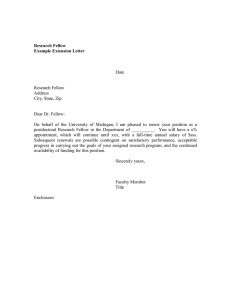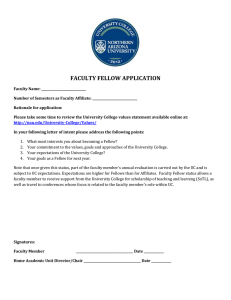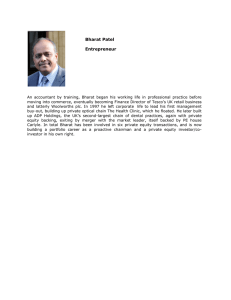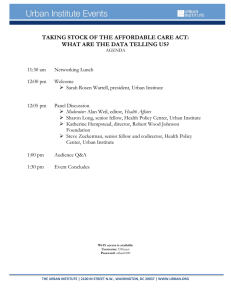Third Graduation Ceremony Padma Vibhushan Dr. Raghunath Mashelkar
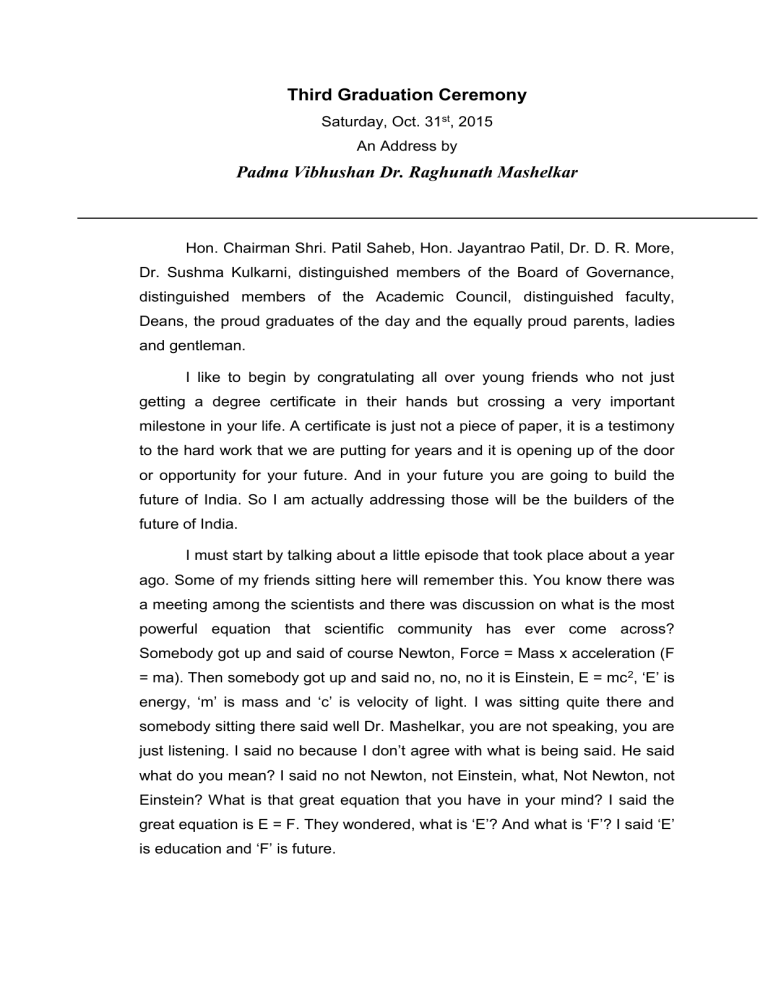
Third Graduation Ceremony
Saturday, Oct. 31 st , 2015
An Address by
Padma Vibhushan Dr. Raghunath Mashelkar
Hon. Chairman Shri. Patil Saheb, Hon. Jayantrao Patil, Dr. D. R. More,
Dr. Sushma Kulkarni, distinguished members of the Board of Governance, distinguished members of the Academic Council, distinguished faculty,
Deans, the proud graduates of the day and the equally proud parents, ladies and gentleman.
I like to begin by congratulating all over young friends who not just getting a degree certificate in their hands but crossing a very important milestone in your life. A certificate is just not a piece of paper, it is a testimony to the hard work that we are putting for years and it is opening up of the door or opportunity for your future. And in your future you are going to build the future of India. So I am actually addressing those will be the builders of the future of India.
I must start by talking about a little episode that took place about a year ago. Some of my friends sitting here will remember this. You know there was a meeting among the scientists and there was discussion on what is the most powerful equation that scientific community has ever come across?
Somebody got up and said of course Newton, Force = Mass x acceleration (F
= ma). Then somebody got up and said no, no, no it is Einstein, E = mc 2 , ‘E’ is energy, ‘m’ is mass and ‘c’ is velocity of light. I was sitting quite there and somebody sitting there said well Dr. Mashelkar, you are not speaking, you are just listening. I said no because
I don’t agree with what is being said. He said what do you mean? I said no not Newton, not Einstein, what, Not Newton, not
Einstein? What is that great equation that you have in your mind? I said the great equation is E = F. They wondered, what is ‘E’? And what is ‘F’? I said ‘E’ is education and ‘F’ is future.
Now that is what you are doing. I must congratulate RIT for building the future. I must congratulate the parents for building the future of the children.
And I must congratulate you for working hard in getting not just the degree certificate but that entire experience of learning in this great institution which stands you in good state as we basically move around.
Now you would say, you are scientist, you have said E = F, you have proposed an equation, you have to prove it. So I will prove it to you. You know the proof came in 10 th October, 2011 and came in Boston in US. What happened on that day, was that the American Academy of Arts and Science which was established in 1718 by George Washington and Benjamin Franklin.
They elect fellows of that academy and they only elect those who have done something special like Winston Churchill was a fellow, Charles Darwin was a fellow, Einstein was a fellow, Nelson Mandela was a fellow, two hundred noble laureates were fellows. So you might ask how many fellows from India from 1718? Only seven so far from 1718. and what happened on that day was that the 6 th and 7 th fellow signed in the register where other fellows are signed.
It’s a special format. You know who was the 6 th fellow? Who gave the first convocation address? Ratan Tata. And you know, who was the 7 th fellow, who signed? The fellow who is giving the third convocation address, Raghunath
Mashelkar. So Jayantrao here is the challenge, out of these seven, two you already got here. The remaining five you have to get them for the convocation addresses. You will say you are side slipping the point. So how do you prove
E = F. And that proof comes because of the following. That it is interesting that it was Sir Dorab Tata Scholarship of sixty rupees per month which I got in
1960 for six years. But without that scholarship I was going to leave my education, because my poor mother could not afford my education. And that sixty rupees they gave for six years that is how I am here. Now interestingly in
1960 somebody will have said fifty years later the head of the house of the
Tata for giving that sixty rupees and you receiving that scholarship will sign in the same book on the same page one after the other. Now how this miracle happened because of the equation E = F. Because I was educated I built my future. Of course it is just not the education but is an opportunity. So my young students, I want to tell you that it is not the degree certificate that is
going to win your future, you must seize the opportunities. You must not only knock on the doors but if there are no doors, create your own doors so as to say. Alright, you have to create your own opportunities. So if education plus opportunity, that will give you basically the future.
This is a very very important day in the lives of the children, in the lives of these parents and in the life of this great institution. So shall we collectively give a big round of applause for the future of this young generation?
Now as a convocation address, I am supposed to say a few words of wisdom for you. So what I will do is that I will use my own experience to share a few things with you. I think the first thing I would like to recognize is that there are two goddesses that we believe one Saraswati and other is Laxmi .
Goddess Laxmi can pleases on you anytime but you need to worship goddess
Saraswati daily, not only daily but till the end of your life. That is my first message to you.
The second message that today’s young generation has got to use instant coffee. They want instant success. There is nothing like instant success. You have to work hard very very hard. Many people ask me what is the root cause of your success. I say I work hard 24 x 7, day after day, week after week, month after month, year after year. I am 72 years old now and I will continue to that till I breathe my last. So there is no substitute to hard work.
The third is your ambition. For example, I want to congratulate the gold medalist today. Now climbing Everest once is not good enough. You have to climb Everest practically every day. You have to work that hard. And you have to keep your aspirations very high. My friends C. K. Pralhad used to say, who is no more, that there is, what is called resource and there is, what is called aspiration. And the aspiration has to be always above the resource. And as our resource goes up, our aspiration goes down. And that is the failure of individuals, of institutions, of industrial enterprises. So keep your aspiration high.
I will tell you a personal story in order to illustrate that point. You know it was mentioned that I became Fellow of Royal Society (FRS), is a very great
honour. In fact when I became FRS, by the way, I remember somebody wrote to me there are now only two great things that will happen to your life, one is
Nobel Prize and second is death, one is certain another is uncertain. That is how great the honour is. And you actually signed in the book that Newton signed. Now when in 1998 I got it, I was very happy and one of my mentors is
Bharat Ratna Professor C. N. R. Rao. So I went to him and said, Sir, I become FRS. I thought he will congratulate me, he will hug me, he will say great. He didn’t do anything. You know what he did? He said not bad. So I was surprised, what is this? I got disappointed and I came back. After that, I became Fellow of US National Academy of science. Again there are only seven scientists from 1870 had that fellowship. In fact, sometimes you would get Nobel Prize first and then became that fellow. Like Sir Harry Kroto got
Nobel Prize first and then he became that fellow. I thought how he will be very happy. So I went to him. He looked at me and said not bad. I was really disappointed and then I got this fellowship of Academy of Arts and Science and again he said not bad. Then I lost my temper. I said, Sir, what do I have to do? Do I have to stand on my head to impress you? And at that time he gave me a lesson which I want to pass on it to you. He said, Mashelkar you are climbing on the ladder of excellence but mind you, it is an unlimited ladder of experience. And limits can come only based on limit that you put. So it is a limitless ladder of excellence. So my message to you is very simple. When you get success in your life don’t get satisfied with it.
The fourth point would be that the education is about learning, doing and being. There are three things. It is not the ability but the attitude that matters. It is not just the mind, it is the mindset that matters and being part means the human being. Being a part of the society and that is very important. And that is why my fifth advice to you will be try to build three abilities as far as you are concerned. The first is innovation, innovation is key to the future that why is say always ‘I’ in India must stand for Innovation. ‘I’ in every individual must stand for innovation; ‘I’ in Industry must stand for
Innovation. So be innovative. Innovation means doing things differently, making a difference, taking risks, creating things with which you will change the world. Not be happy by doing something which makes you first in locality,
No; first in Pune, No; first in India, No; first in the world. That is the innovation part.
The second is passion. Without passion you cannot do anything. And third one is compassion. Compassion is the heart. Compassion for the downtrodden. compassion for the society and so on. That is why, today I was very very happy to go around the exhibition. When I saw your inventions that you have done and I was touched by your thinking of removing the drudgery of the people who needed help. But what touched me most, I will tell you the fact that you are not just looking for removing the drudgery of human beings, even that for bullock that there was a design that was developed for removing the stress on the bullock. What it shows you is that it is something which is inherent quality particularly of an Indian mind. We are very compassionate about what we are.
Everybody talk about ‘ Haldighati Victory ’, there is a story about that. I remember I was reading a newspaper and suddenly I saw that wound healing properties of turmeric were patented by America. I said how can they do that?
My mother knew about it, my grandmother new about it. An incident passed in my mind where we are sitting in our bungalow and suddenly a bird came and fell. With a broken wing and I still remember my mother ran down and brought
‘haldi’, made a paste and applied to bird and that bird died after two hours and we were crying when the bird died. For one moment she did not think that
‘haldi’ works on human being like you but does it work on a bird? To her the bird was the same as human. She had the same compassion for the bird as I saw today for the bullock. As we see for the humanity, and I think that is the very important quality. So innovation, compassion and passion would by my fifth message to you.
I am very happy to see what I have seen in the institution today. I came three years ago, I came today, I came in June 2013. And have seen a remarkable difference. Somebody told me, where only had three patents there now we have twenty six patents. Now as usual I will raise the ambition, twenty six is not good enough, two hundred and sixty and when you get two hundred sixty, I will say no, two thousand and six hundred. That is the way we should
raise our ambition. That is what I mean by keeping the aspirations high. I am very glad to see we are making a sort of progress.
Finally, what is going to matter for India? Simple things – Talent,
Technology, and Trust. Let me explain each one of them. Indian talent, you know USA had economic growth you know why? Roads and railways that trigger the growth. Britain – textiles, Denmark – milk and milk products,
Sweden – timber and timber products, Middle East – oil. If you ask me what is the oil for India? It is Indian talent. I remember, when Atal Bihari Vajpayeeji used to say India’s future is in IT. IT as information technology. I also used to say yes India’s future is in IT but not in information technology but as in Indian
Talent. And it is supreme, we don’t require a proof. ‘Satyam Shivam Sundram’ is happening. Who is the CEO of Microsoft? Satya Nadella, an Indian, studied in India, like here. Who is the CEO of Google? Sundar Pichai, studied like this, product. So may be we will have Shiva. I am not talking about Shiv
Nadar. I am talking about somebody who will make a big difference and may be he will be the Chief for Apple.
Once again what we have to do is, to raise our ambitions. What is our ambition? Somehow to go to United States get Visa and go there. What is our second ambition? To get a job with Microsoft or Google. What is our third ambition now? To become CEO of Microsoft and Google. What should be our fourth ambition? Forget about that and create our own Google and Microsoft in this country. So my young fellows, my young friends, I charge you with creating Microsofts and Googles. As you are reading out, we got jobs in TCS, we got jobs in Infosys, we got jobs in this and etc. That is fine. I would like to raise the bar. Again you should not be seeking jobs, you should be creating jobs. And how do you create jobs? And I saw that in an evidence today. I was very happy to see and Ravindra and I had a good time while talking to one of the entrepreneurs who has created a good product. As to how to take the product to the market. Because mine to market is a very very tough journey.
You can demonstrate a product in RIT but to make it happen in the market place is a tough journey. And for that we have to create an environment. How do we create the future Bill Gates here in our country? The future Microsofts
here in our country? And that is where from Talent, Technology and Trust part, the Trust part comes.
Again my personal experience, anecdotal, I will tell you. About four years ago, I still remember the date 12 th November, Bill Gates had came to
India and four of us have been invited to have dinner with him. And it was a dinner cum discussion. Who were they? Nandan Nilekani was one of them,
Arun Maira was one of them, Anand Mahindra was one of them, and I was one of them. And the discussion went on and Bill Gates has said something interesting, he said in Harvard University he gave the commencement address and in that he gave declared that he was the most successful dropout from Harvard. Of course, he was the most successful dropout. And then he recalled while he was young, he said there was a company in Albukert, those were early days of computer, computer hardware was being manufactured.
They were going to manufacture computer hardware. So he said if they were manufacturing computer hardware, they will require software. So he phoned them up and said I will give you software. He half expected that they will keep the phone down. You know why? The young fellow of twenty and those early days of computer and he is offering software, come on, a joke? They did not keep the phone down. You know what they said? We are not ready. Come after a month. And you know that Bill Gates said thank god that they said come after a month. I did not have the software that I offer. The company had confidence in this young fellow and this young boy had self confidence. So we have to believe on this young generation. This is trust. We have to invest in them. We have to take risks. And that is my request to parents also. Allow them to explore, you don’t know where they will go as a matter of time. We are lacking this in India remain safe. Sachin must score century in every match. He has been criticized when he failed to do so. Therefore, I would say, trust is a very critical part. If I can expand that the country is not suffering from the budget deficiency, it is suffering from trust deficiency. Trust between the politicians and the people, trust between the industry and the society. How we will build the country? Greater tolerance for failure, greater trust amongst each other without that we cannot build. So that is talent and trust.
As far as the technology is concerned there is huge rate of change at which things are happening. Just ten years ago, we had just ten or fifteen million mobiles and today we have nine hundred and sixty million mobiles.
Can you just imagine the rate at which things have changed as a matter of fact? And technology is something that we all are using. So when our Prime
Minister talked about digital India, many of us felt skeptical. Let me narrate on incident, you know Rajendra Pawar, NIIT Chairman, he and I were talking in
Delhi. And he told me an experience which was very interesting where he said that I was walking on the street in Delhi and I saw a poor old man, 75 to 80 years old sitting on the street, on footpath, selling something, a street vendor.
But he was wearing very very colourful clothes. So he went to him and said may I take your snap? He said ok. He took his photograph and he was walking away. He called him back and asked him to whatsapp that photograph. Can you just understand what I am talking about? So, digital
India is already happening. How many of you are on whatsapp? Just raise your hands, good. So technology is going to be a way of life. And there is only way of life - a digital way of life. And there lies the responsibility of RIT. I will tell you what that is.
Recently, I got a paper called Technology 2050 for, in Washington there was a global forum, they have invited me to do that. Now, 2050 is too far, we can’t predict what will happen next year but they insisted that let us look at long term future. And one of the chapters on that is jobs. And technology is going to create new jobs as well as destroy jobs. And all the routine, mundane jobs which are based on logic for example will just manage.
I am the Chairman of the award selection committee for Banking
Technology, Indian Banking Association and I remember I was attending the panel discussion about the future banking. And I remember starting my address by saying you are talking about future banking but is there future for banking? Why? Where the mobile payments starts coming up, you are not going to write a cheque where these people are going to check and after three days…. No, this is the instant, instant messaging, instant actions, instant decisions and so on. And when that happens number of jobs including the
back office jobs that we made money on basically they are going to vanish.
Optimization of knowledge is going to come.
Automobile industry, and I was just asking do you have some courses on autonomous cars, driverless cars and I was told, no. I told you should introduce them. Driverless car, they look unreal but they are happening. Next year they will be introduced as taxis. And the business of motors is changing.
What the people are saying now? I don’t want the car, I want access to the car. And that is why wobble comes. So people say that when I want the car that I need, at a point in time, within two minutes, why the hell should I buy a car? So what is going to happen to automobile manufacturing then? I am the member of the Board of TATA Motors and I am worrying. Whom will I sell the car? If all of you will say that I will only have an access and I will not have ownership. So that is going to change. The ownership is going to change because driverless cars are nothing but sophisticated computers on four wheels. Who is going to manufacture them? BMW, TATA Motors and GM, no they will be manufactured by Google, Tesla, Apple. The entire insurance industry will change. The whole thing is going to change. So wobble will create jobs for drivers and autonomous cars, driverless cars will destroy jobs.
Some are creating jobs, some destroying. So one of the things we need to do in the colleges is we should start looking for the future and start training our students about the future. I said education is good to the future, but what is the future? Therefore, I think we need to do some absolute radical thinking in terms of the way we move, the digital way. And I am happy that you have taken progressive steps to blend digital learning with physical learning that is wonderful because, there is no substitute to that. But we have to be ahead of that and start anticipating changes very quickly.
I would like to end by talking about India. To me it ’s one India, it’s my
India, its India first. And what is the kind of India we would like to see? And the future we would actually like to build? I like to see an India which has ten characteristics . One is ‘Suvidhya Bharat’ (Education), second is ‘Susankrut
Bharat’ (Culture), third is ‘Sushashit Bharat’ (Governance), fourth is ‘Santulit
Bharat’ (Development without destruction), fifth is ‘Sanmrudh Bharat’
(upliftmen t of downtrodden), sixth is ‘Sayanmshil Bharat’ (Tolerance), next is
‘Swatch Bharat’ (You know Swatch Bharat Scheme. In fact, there is a committee that has been created by the Government of India, of 19 members.
I happened to be the member of that committee which is looking at drinking water and sanitation. Technology that will be scalable, sustainable, affordable, rapidly deployable and socially acceptable. As you know it is not about building toilets but using toilets. So, that requires mindset change. So it is social engineering, system engineering that is important), next is
‘Sarwasamaveshak Bharat’ (Inclusive growth), and the last is ‘Swanandi
Bharat’ (sound sleep), internal as well as external happiness that is the new
India that we have to build. This is my message, a ten point agenda for my young friends.
I like to end by again thanking you for having me here. This is the first time that I gave away 656 degrees personally. And I must say there is a great joy in that. I think it was a personal joy because this is a very special moment in your life. Event like this will never happen. It is like your first child. It is like your first rain, when you get a special smell. So this is your first degree. You will never get another first degree. This is very special and you made me a part of it, by making me shake hands with this 656 young people who are going to be the builders of our future. I want to say thank you.
And the final point is like I always do, people call me dangerous optimist. So, therefore as I have said today’s our aspirations are high.
Because if you think of the Everest at least you will reach Kanchanganga ; but if you will think of Kanchangaga, you will reach Hanuman Tekadi . So let’s aim at Everest, as an ambition and what should that be and that ambition would be, I will not be there to see that in 2050, but in 2050 our RIT should be ranked higher than MIT, Boston.
Thanking you.
